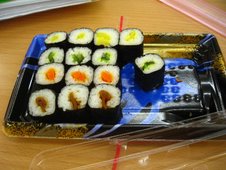Vegan Calcium in Japan
How To Be A Healthy Vegan In Japan:
Calcium カルシウム
Current daily recommended intakes specify at least 1000 mg calcium. Too much is better than too little! Personally, I take calcium supplements everyday and recommend everyone (vegan or not) do the same. These supplements are available as widely here as at home.
Sesame seeds are widely available and very cheap. Adding a handful to whatever you’re making is a great way to boost calcium levels.
Dried figs are also cheap and available at most vegetable stands and supermarkets.
Almonds are a great source of calcium but can be expensive here outside of foreign import stores.
Edamame as well as standard and black soy beans also contain a lot of calcium but that doesn’t seem to hold true once they are processed. Tofu here is not usually packed in calcium sulfate and calcium levels are usually low (for some reason my freeze-dried tofu seems to be high in calcium).
Unlike Western soy milk, Japanese soy milk contains minute levels of calcium, often contains milk products (so be careful!), and is not very tasty (as it doesn’t usually contain sugar or other additives). Eden Soy and Kirkland brand fortified soy milks are available at health food stores and Costco. Rice Dream is also sometimes available but is not a significant source of calcium.
Other milk analogs like soy yogurt, soy ice cream, soy sour cream, and soy cream cheese, are not available at all. I have seen soy cheeses (and almond cheese) but these always contain casein and are thus not vegan.
Most leafy greens like kale, collards, and Swiss chard are not available here either. Spinach seems to be the only exception.
Calcium/100g
sesame seeds 718
freeze-dried tofu (5 blocks) 482
soybeans 277
almonds 248
edamame 197
garlic 181
raw kelp 168
raw wakame 150
dried figs 144
wasabi root 128
spinach 99
tempeh 95
oats 54
soy milk 4



